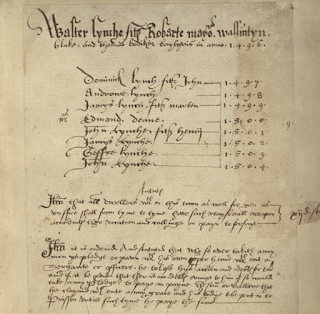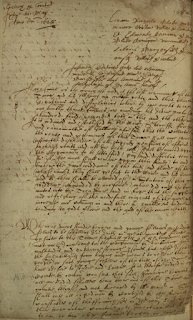Galway Corporation Records
We recently migrated the digitised records we have from the Galway Corporation records archive to our digital repository. The archive contains the records of the Galway Corporation from its foundation in 1485 to 1818. The statute book from 1485 to 1710 (named Liber A) gives the names of members of the corporation, statutes passed, and the minute books of meetings of the corporation from 1679. The minute books contain the dates of meetings, attendance, and business transacted. Liber A script can be challenging to read, and it was transcribed at a later date. The transcription is also published alongside the original manuscript.
Liber A makes for interesting reading, while the town may have struggled somewhat in the fourteenth century, there is no doubt that the town begun to expand rapidly in the fifteenth century. We have picked some highlights of the material that show how important Galway’s walls were to the running of the town, how important sanitation was, and also the control of English rule on the structures of power and influence within the town.
Some of the entries are difficult to make sense of because of the use of Old English. We have summarised the core message of some of these entries.
Liber A Highlights
Page 3 (Transcriptions Book)
A statute permitting men to hold arms should their jobs require it, whether or not they are “freemen” of Galway. We see in later entries that the sale of fire-arms or any weapon making material to Catholics or Irish became illegal. It also became illegal for any suspected rebels to be sold any weaponry. (1496)
" Item: That all dwellers within this town, as well fremen as unffree, shall from tyme to tyme have such reaysonable weapon accordinge to ther vocation and callinge, on payn to forfayt."
Page 11 (Transcriptions Book)
Some statutes regarding the importance of sanitation in and around the walls of Galway. The statute stating that the front door of every house must be cleaned every week is particularly noticeable, as well as the fact that goats and pigs were not allowed to be kept in the town for more than a fortnight in order to prevent the spread of sickness or disease in the town. There are other statutes from around this time concerned with the keeping of animal hides, which makes it seem like sanitation around the keeping of animals, or livestock was a concern in the town around this time. (1508)
1. Item: Whatsoever man, woman, or childe, be found foulling the streets or walles ether by night or day to lesse.
2. Item: That every man make cleane befor his door once every week.
3 And that no donge heape be made uppon the strettes on payn.
1.-Item: Whatsoever man or woman have any kyne in town shall keape them in ther houssis and clossis, both somer and winter, and if they be found uppon strettes to paye.
2.-Item: That no swyne nor gottes be keapt in town above ffourten dayes on payn of killinge both swyn and gottes, and the owner to aunswer for all such binderances as they shuld do .
Page 15 (Transcriptions)
Here we see a statute regulating the sale of weapons, or materials for making weapons, to the Irish or anyone suspected of rebellion. It states a fine of one hundred shillings and a prison sentence for committing such a crime. The section stating that anyone found guilty would remain in prison until amends are made is particularly unsettling as it is such a vague rule. (1517)
"Item: That none of this towne shall gyve ne sell privately nor openlye to no Irishe, nor none suspectid persons in waye of rebellion, anny invincion, as hand-gounis, callivers, poulder, leade, nor sall-petter, nor yet longe-bouis, crosboues, crosboue stringes, nor yearn to make the same, nor no kynde of weapon elIes, on payn to forfaite the same municion and also an hundred shillinges. Likewysse if anny hurte or lostes come to the town through selling of the same, he that so sellith it his body to remayn in prisson untill such tyme he makith amendes of such hurtes.
Page 17 (Transcriptions)
Statute restricting trade with non Freemen, except mariners, and regulating who qualifies for freedom of city to those who speak English and shave their upper lip weekly. This precedes the initial use of Penal Laws against Irish and Catholics but these rules show how the Irish were beginning to be kept away from positions of influence. (1522)
Item: That it ys orderid that no merchaunte of this towne shall not gyve no partnership to no man havinge not his fredome, excepte it be maryners; and the said maryners not to retaylle no merchandiz. Also, that no man shalbe made fre unlesse he can specke the Englishe tonge and shave his upper lipe weekly on payn to lose.
Page 19 (Transcriptions)
This statute set out limiting what kind of sports may be played within the walls of Galway. It seems like hurling was forbidden, as well as using hands to play with a football. It also forbids the throwing of any darts or speres and the use of any bows. Only football was allowed to be played within the town. (1527)
Item: Yt ys ordered, enactid and statutid that what so ever lllan is found, of what degre or condicion so ever he be of, plainge at choytte's or stonis but onely to shute in longe bowes, shorte crosbones and hurlinge of dartes or speres, to lesse at every tyme so founde de in doinge the same, and also at no tyme to use ne ocupye the horlinge of the litill balle with hockie stickes or staves, nor use no hande ball to playe without the walles, but onely the great foote balle, on payn of the paynis above lymittid.
Page 91 (Transcriptions)
Statute expelling beggars and those pretending to be students, authorising whipping and fines if they return. It seems that people coming to the town from other parts of the country raised paranoia about what “dangerous” and “strange” foreigners may be doing in the town. The statute also declares that these people would be sent away from the town back to where they come from, and if they were detected again they were to be “whipped” out of the town. The keepers of the gates also faced a fine of five pounds sterling for negligence should any of the imposters come through their gate. (1628)
"Whereas divers sturdie beggers and younge fellowes pretending themselves to be schollers doe dailly in great numbers flocke and resorte to this towne from all partes of the kingdome, which is not onely dangerous to the Corporacion by harbouring such multitudes and unknowne straunge personnes, but also disableth the inhabittantes from haveing anie meanes to relieve their own people or such younge schollers of the birth of the towne, who have a desire to studie and learne: It is therefore ordred in oppen courte, by common consent, that such forreigne beggars and all pretended schollers beinge borne out of this towne and countie therof and not licenced by the Maior or Sheriffes, shall with all expedicion be conveyed by the severall constables of the frauncheses into the way leading towards their owne native countrie, with directions that if any [of] them or any other forraine beggar or poore scholIer doe returne thereunto againe without licence, as afore-said, that they shalbe whipped out of this towne and countie, that the porters of anie gate through which anie such begger or poore scholler shall come shall forefeit five [pounds] sterling as a fine to the Corporacion for his or their negligence in suffering [them] to come to the towne, to be leavyed by distresse or action of debt, and to be further punished at the Maior's discrecion.”
Page 119 (Transcriptions)
Memorandum recording that the English inhabitants of Galway petitioned to prohibit Irish and Catholics from holding civic office. This was granted, meaning that only English and/or Protestants would govern Galway. This preceded the Ascendency Rule which was brought in to power with the Penal Laws, but it enforced the same rule which was to keep Catholics out of positions of power across Ireland. (1654)
" Memorandum : That the English inhabitants of Gallway, did on the 29th of' September, this yeare, petition the Right Honorable the Lord Deputy and Councell that the government of this towne by the charter might not be any longer in the handes of the Irish and Papists, but that it might be put into the hands of the English and Protestants. Which was granted, and by vertue of a spetial order in that case the officers above mentioned was dismissed and new ones chosen, as in the next will apeare.
Page 121 (Transcriptions)
Copy of letter (inserted into the manuscript)from John, Lord Berkley, Lord Lieutenant authorising the corporation to capture pirates and to promising a bounty for each pirate captured. The letter lays out the impact these pirates had upon traffic to the town, merchants becoming discouraged and also unrest from the “majesty”. (1670)
"After our hearty commendacions: Understandinge that a pirate lyes uppon that coast, by which traffique is hindered, marchantes discouraged, and his Majestie prejudiced in his customes and dutyes, and that you are willinge to send out a vessell and men to chase from that coast or take the pirate, if you had warrant for soe doeinge, wee think fit by this our letter to authorize and impower you to proceed in your good intentions of service to his Majestye and that place, and to send out a vessell and men to sea, such as yow shall thinke fitt for the purpose aforesaid. And, for the encouragement of the men you shall imploy in this service, you may assurre them from us that for eyery man they shall take and bringe in from aboard the said pirate, they shall receive the allowance held forth and promised in the proclamation issued by us and the Councell for kilIinge or takeing the Toryes or Rebells in the said proclamation named. And soe wee bid you heartily farewell from his Majestie's Castle of Dublin, the 12th of August 1670.
Your loveinge friend, JOHN BERKELEY.”








Comments